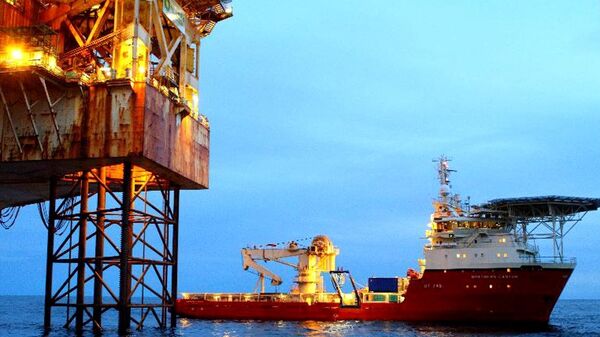Global crude oil prices have halved since last summer as fast-growing US shale oil production outstrips demand. If they continue to slide or hover under $60 per barrel they will ruin Britain's oil industry.
Robin Allan, chairman of the independent explorers' association Brindex, told the BBC that "Britain's industry is close to collapse. In terms of new investments — there will be none, everyone is retreating, people are being laid off at most companies this week and in the coming weeks. Budgets for 2015 are being cut by everyone."
Richard Wellings, from the Institute of Economic Affairs agrees with Robin Allan. He told Sputnik News UK: "The oil price drop is a tremendous problem for the UK industry and it will completely destroy new investment."
The oil price has dropped before and the industry does adapt; but that process of adaptation is brutal. "It's one of slashing people, slashing projects and reducing costs wherever possible, and that's painful for our staff, painful for companies and painful for the country." According to Mr Allan, many of the job cuts across Britain's oil industry won't have been publicly announced. Oil workers are usually employed as contractors, which means they're not hard to lay off.
His remarks add to last week's warning from veteran oil executive and government adviser Sir Ian Wood, who predicted a wave of job losses in the North Sea over the next year.
The shocks are being felt in oil companies across the globe, but Britain could suffer a particular blow.
Most of its oil reserves are concentrated in the North Sea and it's expensive to reach the oil beneath the seabed. Unlike a country such as Saudi Arabia, where reserves are just beneath the land and cheap to extract (costing $5 dollars a barrel), extraction in the North Sea is only economic when oil prices are high.
Britain's oil companies struggle to make money when the price is less than $80 a barrel. Analysts at investment bank Morgan Stanley warn that oil could fall to $40 a barrel in the second quarter of next year if OPEC doesn't limit supply by cutting their production.
In addition, the North Sea's oil fields are mature: there's not much oil left. That's why last year saw the highest level of industry investment on record.
The plan was to explore new fields further West, in the cold, deep, windswept waters of the Atlantic. Engineering there would be even more expensive.
On top of that, North West Europe is a high-cost area to do business, thanks to heavy taxes and high labour costs.
Eventually, if Britain and other labour intensive producers do not explore new fields, that might reduce the world's supply and trigger demand. That could spike the oil price, making investment worthwhile. But if it happens, it will be many years down the line.
Sputnik News UK asked Richard Wellings what it bodes for Britain's economy: "It's terrible news for Scotland. The Scottish economy is dependent on two sources of income. One is subsidies from the rest of the UK and the other is the oil industry. In Aberdeen there are lots of jobs based around new exploration and investment. High oil prices meant Scotland was a net contributor, but that will soon change."
Subsidising Scotland is about to get a lot more expensive.
If industry investment drops off — as it is already doing — it's bad news not just for Britain but for Europe as a whole. Hundreds of billions of dollars of investment are needed to extract the continent's remaining reserves. Wood Mackenzie, a consultancy, says there are more than 30 potential European oilfield developments that won't go ahead if prices fall beneath $60 per barrel.
So, where will the job cuts come from?
BP, a London-based energy company, has already cut $1 billion from its capital expenditure plans.
The US-based oil giant ConocoPhillips is cutting 200 out of 1,500 jobs in the UK.
This month it announced a 20% reduction in its worldwide capital expenditure budget.
Research from the investment bank Goldman Sachs predicted that other big oil firms would need to cut capital expenditure by 30% to restore their profitability at current prices.
Service providers to the industry have also been hit. Texas-based oilfield services company Schlumberger cut back its UK-based fleet of geological survey ships in December, taking an $800m loss. It declined to specify how many jobs were cut.
Sir Ian Wood's Aberdeen-based Wood Group announced a pay freeze for staff, and cut rates for its contractors.
When the oil price was high — at more than $100 per barrel — there was a lot of grumbling from consumers. So, perhaps it's not all bad news. An oil price fall normally boosts GDP by shifting resources from producers to consumers, who are more likely to spend their gains.
But, there's a catch for Britain. The UK's economy is heavily based on the financial sector: the banks who lent money to oil companies who are now panicking.
The FTSE 100, a London-based stock market index dominated by extractive-industry shares, has had its worst week in three years, with a 6.3% fall.
Sputnik asked Robert Wellings for an overall assessment: "The UK is now a net oil importer so it may benefit from the lower oil prices. However, it's also an economy very heavily based on the financial sector and there are problems there. The UK stock market is partly dependent on some of these big oil producers as well."
The 1970's oil shocks transformed the world economy and the latest changes look set to do the same. It could even spell the end of the road for the North Sea and its oil, at least for a while, as some industry analysts say fields might be closed entirely if the price continues to fall.




